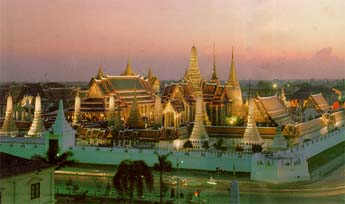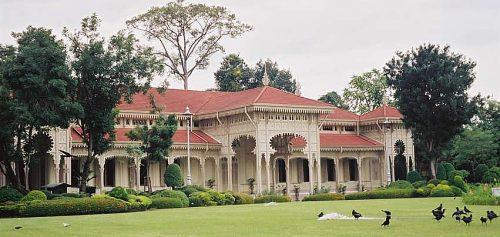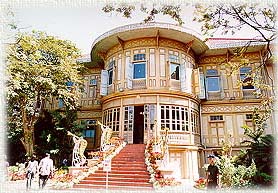Around the same time that the Cartoon Crisis was coming to a head, another situation was developing in Thailand. This controversy threatened to bring down the government of Thaksin Shiniwatra, the prime minister of Thailand.
Thais demonstrated in the streets and called for Thaksin’s ouster because Shin Corp., a company formerly owned by Thaksin, was sold to a state-owned Singapore company for 73 billion baht ($1.88 billion dollars). Their anger arose from the fact that the principals managed to avoid paying capital gains taxes due to the highly technical nature of the sale.
Initially, I sympathized with the demonstrators, but didn’t really see what constitutional basis they had for bringing down the government. Of course it doesn’t sit well when ordinary folk pay 7% ad valorem taxes, while the well-to-do pay nothing on $1.88 billion dollar stock sales. But the law’s the law, and tax avoidance is perfectly legal. You don’t fire prime ministers for obeying the law.
I also didn’t care for some of the hyperbole coming from the opposition newspapers. Rhetoric such as this:
[Thaksin’s] increasing hostility toward the country’s intellectuals has prompted sarcastic asides that he is less of a Hitler and more a modern-day Pol Pot. He may also even be more shrewd than the former Khmer Rouge leader because he has managed to appeal to the grassroots community despite his enormous wealth.
Pol Pot or Hitler, or simply a badly misunderstood leader, Thaksin is facing an increasingly strong alliance bent on toppling him through three-pronged assaults.
Uh, folks, some perspective, please. Thaksin isn’t Pol Pot, and he isn’t Hitler. Not by a long shot. There are NO death camps or genocides taking place in Thailand. You can’t even claim that he’s Pinochet, killing members of the political opposition.
Now don’t get me wrong, Thaksin DID order death squads to carry out the extrajudicial executions of about 2,500 drug pushers in 2003 – and for that denial of due process he SHOULD have been impeached. Instead, Thais "punished" him in 2005 – by re-electing him with an overwhelming parliamentary majority. Guess drug pushers aren’t the most sympathetic of minority groups.
So there’s no use crying over that spilt milk. As it turns out though, there’s a good argument that laws were bent and broken in the here and now. Prior to Thaksin’s election in 2001, he owned a majority stake in Shin Corp, a Thai telecommunications company, and was said to be the richest man in Thailand. After his election, he was required to sell off all but 5% of his shares, or place them in a blind trust. This he did, in rather an ingenious manner.
Thaksin complied with the law by placing some of his Shin Corp. shares in his relatives’ names. Other shares were placed in the names of his maids, servants, and even his personal chauffeur. What remained was deposited into a dummy investment firm called "Ample Rich". Ample Rich (jeez – what a name!) is interesting, because although Thaksin claims to have sold it, no one really knows who the current owners are. As a matter of fact, no one even knows where the company is headquartered – the documents filed with the Thai tax authorities list a false address in Singapore for it, although Thaksin insists it’s based in the British Virgin Islands.
This is how the scandal appears to me, then. Thaksin owned a company that had been granted a government monopoly. Once he became prime minister, he "transfered" ownership to those around him, and proceeded to change the laws governing his monopoly to make it even more valuable. On January 20/06, his party passed the Thai Telecommunications Act, which raised the maximum foreign ownership threshold (allowing him to sell more of his shares off). Three days later, all of the shares owned by his children, relatives, maids, servants and chauffeurs were simultaneously sold, as if directed by a single intelligence, to a company in Singapore. By strange coincidence, the shares held by the mysterious address-less Ample Rich were also sold to Thaksin’s children at the bargain basement price of 1 baht per share, then promptly resold to the Singaporean company for 49 baht per share.
As I said before, Thaksin claims that he sold Ample Rich and therefore has no control over it. If that’s true, then the new Ample Rich owners must have just randomly picked Thaksin’s two eldest sons out of thousands of investors and decided out of the goodness of their hearts to sell them shares at a fraction of their current market value. Either that, or the owners of a multi-million dollar investment house suffered a really bad case of amnesia, and forgot everything they ever learned in Econ 101 about profit-maximization.
Believe that if you wish. But a simpler explanation would be that Thaksin still controlled Ample Rich and wanted to give his sons an illegal 1 baht per share sweetheart deal.
The consensus seems to be that the biggest legal threat to Thaksin lies in the Ample Rich part of the trade. There is a certain sad irony in the fact that Thaksin, by all accounts a devoted family man, may have placed his two eldest sons in legal jeopardy along with himself.
As of this date, Thaksin has managed to survive politically. Over the past five years, wealthy supporters have bought out critical newspapers, or changed their editorial views by withdrawing advertising. Some independent media still exists in Thailand though, and indeed initial reaction to the Shin sale came from media mogul Sondhi Limthongkul. Sondhi’s own democratic bona fides are open to question however, especially since many have interpreted his request for the country’s military to "stand by the people" as a call for a military coup.
(A colorful side note: about 2,000 Thaksin supporters in a small town near Chiang Mai marched to a graveyard one night in order to place some kind of voodoo-like curse on Mr. Sondhi. I think that it was in a front page story in the Feb 10/06 {or thereabouts} edition of the Bangkok Post, but I’ve since lost the newspaper clipping.)
At any rate, Sondhi ceased to be the focus of the anti-Thaksin movement when the cause was taken up by members of the Thai political establishment. Their quest will be not be easy:
The first [attempt at impeachment] was aborted [on Feb 16/06] when the 27 senators failed in their attempt to [petition the Thai Constitution Court to begin impeachment investigations].
The second seems likely to meet the same fate. The Opposition, which has 124 House seats, will find it nearly impossible to gather 200 signatures of MPs to file a censure motion against Thaksin.
There’s a glimmer of hope in the third, the collection of 50,000 signatures to launch impeachment proceedings against Thaksin (as of [Feb 16/06] 20,000 signatures had been gathered.)
But the hard part is the impeachment process. When the Thammasat University Student Union gathers enough signatures, they have to send them to the Senate Speaker and then to the National Counter Corruption Commission. And that’s tricky, because there is no NCCC currently in operation. (emphasis added)
(From "PM slips past constitution court net again" in the Feb 17/06 edition of The Nation. Sorry, no link is available.)
UPDATE: Some members of Thaksin’s own party have asked him to step aside for the good of the party. Thaksin’s shifting statements on the matter offer some insight into his thinking:
"I will consider [resigning] in my next reincarnation."
“I will die in office.”
“I won’t step down until I can find a successor who can run the country and the party.”
“Even hardened criminals get their sentences commuted to half if they eventually own up to having committed the crime.”
UPDATE #2: Remember the possibility that 200 MPs could band together to force impeachment proceedings? Recall too, the numerical hurdle: members of Thaksin’s own party would have to vote for his impeachment. On Feb 24/06, Thaksin made good on his threat to dissolve parliament before this could happen.
How calling a snap election for April 2nd will save him is beyond me – unless he thinks that his ethical and legal improprieties can win him an even larger majority this time around.
Or maybe he’s simply been advised that the stars are right.
UPDATE (Feb 26/06): Blame my confusion as to Thaksin’s motives for calling an election in Update #2 on the lateness of the hour in which it was written. Thaksin’s goal is transparent. Change the subject. Talk about low-interest loans to Thailand’s rural poor. Discuss tax cuts for roadside vendors in Bangkok, the heart of the anti-Thaksin movement. Thaksin’s populist policies have been immensely popular among Thailand’s large population of the poor, so one of his goals will be to create fear amongst this voting bloc that his policies will be discontinued if he’s not re-elected.
Imagine if the Lewinsky scandal had broken, not in ’98 but during campaign ’96, and that Clinton had gone on to win by a landslide. At that point, Clinton would have been able to make the persuasive case that the people had reviewed his transgressions, and judged them to be inconsequential. He would have been politically untouchable.
Thaksin’s use of death squads in ’03 went unpunished partly because of his overwhelming victory in ’05, and he thinks he can repeat that success now. Thais have it in their hands the power to grant or deny him that impunity.
May they get the leader they deserve.
UPDATE #4 (Feb 26/06): The opposition is considering whether it should boycott the election, raising the spectre of some kind of Hugo Chavez situation. Meanwhile, Santa Claus is on his way, with lots of election goodies on his sleigh:
[Thaksin] spent two thirds of his hour-long speech talking about help he wanted to give to laborers, civil servants students and farmers hit by inflation fuelled by high oil prices.
Thaksin promised a rise in the minimum wage in Bangkok, where the opposition to him is strongest by far, and more debt relief for farmers in the countryside where 70 percent of Thais live and where his support is thought to be solid.
There would also be pay rises for civil servants and a plan to give part time jobs to students, Thaksin said.
Not one to settle for bribing the judge, Thaksin has decided to bribe the electorate.
UPDATE (Mar 18/06): Recall that Thaksin skirted the law by transfering assets to his employees. It turns out that:
At one point, two of his domestic servants were among the top 10 shareholders on Thailand’s stock exchange.


